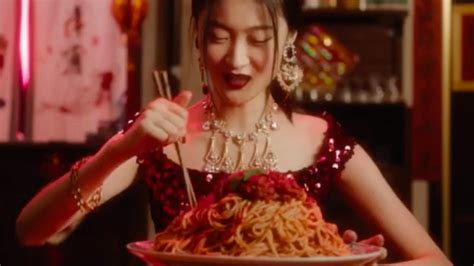dolce gabbana commercial 2018 china ,dolce and gabbana scandal,dolce gabbana commercial 2018 china, Dolce & Gabbana was forced to cancel the Shanghai fashion show before it was scheduled to begin due to celebrities boycotting the event and models reportedly refusing to participate.
Swiss Made IWC Mark XVI Replica Watches Perfect Clone From Genuine Online Save Money Best Online Replica Watches On hotwatchsreplica.com. . how to copy IWC Mark XVI .

In 2018, the iconic Italian luxury fashion house Dolce & Gabbana found itself at the center of a massive scandal that would not only tarnish its brand image but also spark intense debates around cultural appropriation, racism, and global marketing practices. The controversy began with the release of a series of ads for a fashion show in China, featuring an Asian model who struggled to eat Italian food using chopsticks. The ads quickly ignited outrage, sparking a backlash that led to a significant public relations crisis for the luxury brand. This article explores the events surrounding the Dolce & Gabbana China scandal, the fallout from the controversy, and the brand’s efforts to apologize and salvage its reputation.
The Dolce & Gabbana China Scandal
The Dolce & Gabbana commercial that sparked the controversy was part of a promotional campaign for the brand’s 2018 fashion show in Shanghai, China. The commercial, which depicted a Chinese model attempting to eat a traditional Italian meal (pasta, pizza, and cannoli) with chopsticks, was perceived by many as culturally insensitive. The model’s struggle to use chopsticks while eating Italian food was portrayed in a way that many viewers felt perpetuated harmful stereotypes about Chinese culture and intelligence. Critics argued that the commercial not only trivialized Chinese culinary practices but also mocked the model's ability to embrace Italian cuisine in a condescending manner.
The video, which was intended to be lighthearted and humorous, backfired in a way that was both shocking and damaging to the Dolce & Gabbana brand. The initial reaction to the commercial was swift and overwhelmingly negative, especially from Chinese audiences, who felt that the ad lacked cultural sensitivity and understanding. Many viewers on social media platforms like Weibo, China’s most popular social media site, voiced their anger and disappointment, calling for a boycott of the brand.
However, the controversy didn’t end there. The situation escalated when a series of Instagram posts by Stefano Gabbana, one half of the Dolce & Gabbana duo, emerged. These posts, which appeared to mock the backlash from Chinese netizens, were seen as further evidence of the brand’s lack of respect for Chinese culture and consumers. The posts were filled with derogatory comments, and Stefano Gabbana allegedly referred to the Chinese people as "noodles" and used offensive language to describe the controversy. These comments, whether intended to be private or not, ignited an even bigger storm of outrage, especially in China.
The Dolce & Gabbana Scandal: The Aftermath
The backlash against Dolce & Gabbana quickly snowballed, and the brand found itself facing a full-blown crisis. The company’s failure to properly respond to the controversy and the emergence of insulting social media posts further fueled the anger of Chinese consumers. The scandal reached a boiling point when major Chinese celebrities, including model Liu Wen, actress Zhang Ziyi, and singer Karen Mok, publicly announced that they were cutting ties with the brand. Liu Wen, who had previously worked with Dolce & Gabbana, removed all photos of herself wearing the brand from her social media accounts, signaling her disapproval.
Moreover, high-profile Chinese influencers and celebrities also pledged to stop promoting the brand. In response, the fashion house was forced to cancel its highly anticipated runway show in Shanghai. The show, which was expected to be a glittering affair with the participation of many celebrities, was suddenly called off, and the international media was left to scrutinize the brand’s blunders in the face of such a massive cultural crisis.
Dolce & Gabbana's Apology: Too Little, Too Late?
In the wake of the scandal, Dolce & Gabbana issued a public apology, both through official channels and via a video message posted on social media. In the video, Domenico Dolce and Stefano Gabbana, the founders of the brand, expressed regret over the incident and claimed that the commercial was never meant to offend anyone. However, their apology was widely criticized as insincere and inadequate. Critics noted that the fashion house’s apology seemed more like a damage-control strategy than a genuine attempt to address the issues at hand.
Dolce & Gabbana’s apology came with a statement that they had "great respect" for Chinese culture and its people, but many Chinese consumers felt that this gesture was too late. The damage to the brand’s reputation in China had already been done, and the backlash continued to grow in intensity. Some even questioned whether the apology was simply a public relations move rather than a heartfelt acknowledgment of the harm caused.

dolce gabbana commercial 2018 china IWC Pilot Replica Chrono Top Gun TWF Swiss 7750 $ 850.00 Model Top Grade Pilot Chrono Edition iw377714 Case Diameter 43mm x15mm Perfectly Accurate to Original Case Material Ceramic Bezel Made of Ceramic Structure IWC .
dolce gabbana commercial 2018 china - dolce and gabbana scandal